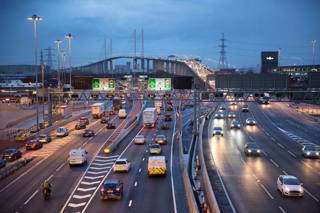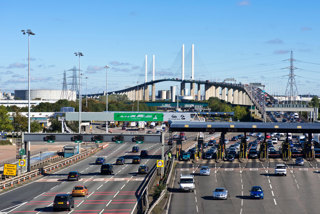Work to improve the road layout around the Dartford Crossing has almost been completed, but a new payment scheme is leaving fleets frustrated.
Dart Charge was launched last November to speed up journeys at the Dartford Crossing, and give drivers more flexibility about how and when they pay the crossing charge. Toll booths were removed and drivers are instead expected to pay online, by phone or at one of the nationwide network of retail outlets.
Early indications show that average travel times have improved, according to Highways England, with journeys more than nine minutes quicker southbound and more than four minutes quicker northbound. It also says that journey times are set to improve further when road works are completed this summer.
However, around 700,000 fines have been issued since the scheme was introduced. Fleets have reported problems with roadside warning signs, the Dart Charge website and an increase in administration dealing with fees and fines.
Sue Mosley, global fleet coordinator at C&J Clark International, says she has been hit with “a flurry of Dart Charge fines”, with fine notices often taking more than two months to be received. Operating a leased fleet of 250 company cars, the fines are paid by the employer’s vehicle provider. However, the £35 fine, plus the original £2.50 charge and a £30+VAT administration fee are passed on to offending drivers. One driver has so far received four fines.
Mosley explains: “This is of considerable concern to drivers, particularly when some have had more than one fine in a week. It appears that the new payment process has not been made clear to drivers, so they are unaware until the fine comes through. We encourage drivers to self-manage, but we want to support them as much as possible.”
A message has been sent to drivers making them aware of the new payment regime.
Andrew Houston, head of information and communication technology and fleet at Letchworth-based The Altro Group, says account details need to be easier to change, particularly when an employee leaves and a vehicle is reallocated.
“If an individual employee takes out an account in their own name – even if the Dart Charge fee is recharged to the employer for a company owned or operated vehicle – and they leave, beware, the registration number is locked to that account,” he says.
“Even if you have access to the account, you cannot remove the vehicle as there has to be one left on the account. This means, if the vehicle is re- allocated to another employee, you cannot raise a company account nor top up the original account. Even supplying proof of ownership or operating will not enable access to the account.”
Houston eventually resolved the issue, saying it “took several hours of my time and accounts department time”.
In the interim, the employee who had been reallocated the company car and was a frequent Dartford Crossing user had to remember to pay the fee by midnight on the day after using the Crossing to avoid incurring a penalty charge.
Serco has almost 300 pool vehicles registered on Dart Charge and the company’s account runs to 35 pages.
The company’s fleet manager, Sue Blair, says: “The inability to download a report from the website for such things as registered vehicles is frustrating. If you want to check that a vehicle is registered, you have to scroll through pages and pages to manually pick it out. We have to cut and paste into an Excel worksheet, as reports cannot be downloaded to be able to manage payments and recharge them back to cost centres.”
With a fleet of more than 4,000 vehicles, she says more may have been registered on Dart Charge if the management reporting process was easier and business and private journeys could be easily identified to meet HMRC benefit-in-kind reporting criteria.
Highways England says it is making improvements, and motorists fined for the first time will have two weeks to pay the road user charge of £2.50 per car, instead of the fine.


















sal - 21/10/2015 16:35
Dont just pay fines. Make sure u contessed them not only am I getting at least 1 fine a week even tho I have proof of payment I have also recieved fines where the time on photo dont match with the time they put that you have passed through. All I get told is its a technical problem. But there must be so many people paying fines when they have already paid for journey. Customers service are rude and unhelpful. I even had someone yarning and speaking to another member of staff while I was trying to sort these problems!. Still to this day I have had no explaination or help!